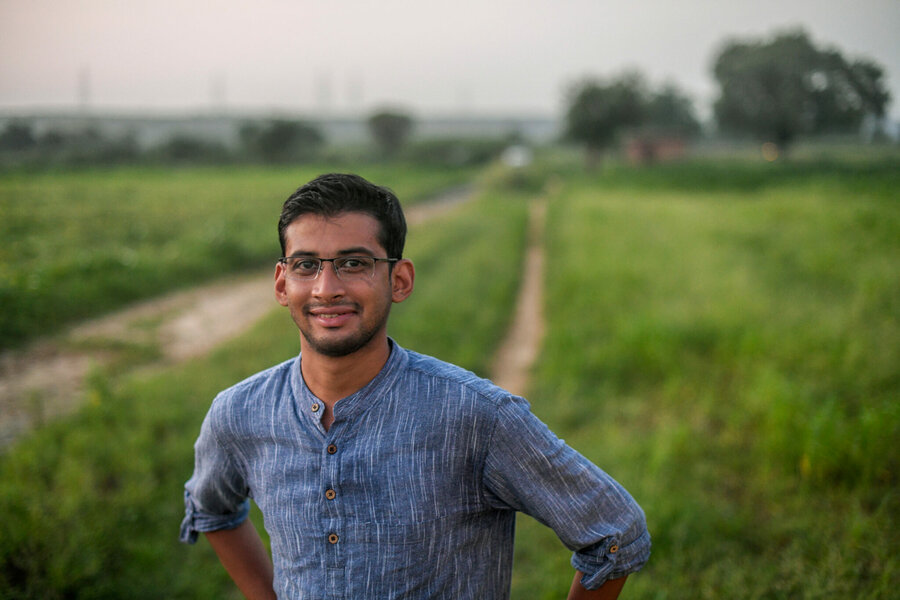Innovative idea helps to reduce the impacts of climate change

“We were always affected by bad air quality,” says Vidyut Mohan, an entrepreneur from Delhi, India. “Family, friends, loved ones are always falling sick because of it.”
Pollution in some parts of India has reduced life expectancy by up to a decade, and the burning of agricultural waste is one of the leading causes. “The cheapest and fastest way to get rid of agricultural waste is for farmers to just set it on fire,” he says.
Vidyut says he can remember pollution levels reaching particularly high levels in 2015, so he decided it was time to do something about it.
Using his expertise in mechanical engineering and biomass technology, Vidyut and co-founder Kevin Kung created a portable machine that attaches to tractors and turns crop waste into sellable bioproducts like fuel and fertilizer. This process reduces smoke emissions by more than 95 percent, compared to burning waste products in the open-air.
In 2021 – and just six years after he decided to act – Vidyut, Kevin and their company Takachar won the Earthshot Prize and GBP 1 million to continue to develop their project.
“The Earthshot Prize fostered a lot of connections with key industry partners and helped us reach a lot of customers who are keen to buy the machine,” says Vidyut. This, along with support from the World Food Programme (WFP) Innovation Accelerator’s Sprint Programme is helping the Takachar team to progress from a prototype to a functioning machine ready to be used by farmers across the world.
Vidyut says he dreams that one day his company will be a household name and it will help limit some of the US$120 billion worth of biomass (crop residues) that are burned globally every year.

For Takachar, momentum is building. The company was recently selected as a milestone winner in the XPRIZE Carbon Removal competition funded by Elon Musk and the Musk Foundation. Takachar was awarded US$1 million and will move forward in the competition to potentially win a staggering US$80 million in 2025.
“I wanted to get into it personally from a climate justice perspective,” says Vidyut. The climate crisis affects those who contributed the least to the problem, but they experience the worst of the impacts. In a year where humanitarian needs are spiraling, and the ripple effects of the Ukraine crisis are worsening food insecurity across the world, putting 276 million people one step closer to starvation, tackling the climate crisis is more urgent than ever.
Not only does Takachar’s machine reduce the dangerous emissions being released into the atmosphere, it also processes and treats the agricultural waste, turning it into products such as fuel, fertilizer or raw materials to make activated carbon that can be sold at markets.

“The idea is for the people who own and operate our machines to essentially run a small business,” says Vidyut. Users are trained on how to operate the machine and the company also helps facilitate links to markets by connecting machine owners with power plants looking for fuel.
Vidyut says that as more people are voicing their concerns about climate change, many are now becoming entrepreneurs to do something about it. “For the people being affected by climate change and air pollution…only when you have that feeling emotionally can you then be driven to do something about it.”
To tackle the climate crisis and protect the most vulnerable, we must urgently mitigate the problem by reducing emissions whilst simultaneously supporting communities to adapt to the worsening impacts.
Do you have a game-changing idea to tackle climate change, address hunger or build more sustainable food systems? Apply to the WFP Innovation Accelerator to receive up to US$100,000 in equity-free funding, mentorship and access to the world’s largest humanitarian organization.
The Innovation Accelerator's Sprint Programme is an intensive six-month programme that helps innovators and start-ups to develop prototypes ready for implementation. Teams receive up to US$100,000 in funding, world-class mentors, and access to WFP’s global network of partners field operations.

As well as supporting farmers through Takachar, Sprint has also worked with families across the world to fight hunger, malnutrition and build their livelihoods. This includes supporting farmers in Ethiopia to reduce their food losses, helping families in Kenya to access markets to sell their crops and helped children to eat fresh and local foods in Guatemala.
WFP in India is working closely with the Takachar team to measure the impacts of this machine. This data will be shared with the Government of India to highlight the impact that innovative solutions can have on improving air quality in India and around the world.
